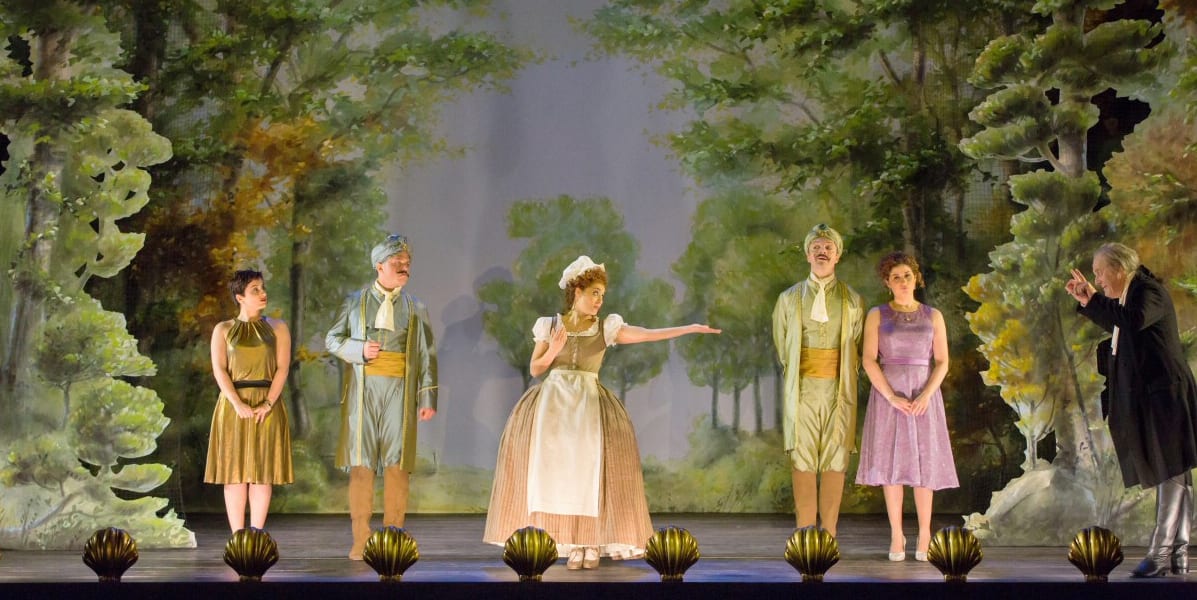Covent Garden’s revival of Jan Philipp Gloger’s production of Cosi Fan Tutte makes a welcome return to Covent Garden. Cosi has always been regarded as a difficult opera to stage because of the misogyny of the plot. In an attempt to undermine this misogyny, Gloger presents the audience with a Don Alfonso who is a surreal theatre director putting the four lovers into a series of improvised scenarios to test out their views and feelings about love and fidelity. The opera’s subtitle is ‘The School for Lovers’ and, in this version, Don Alfonso and Despina are the teachers. But Da Ponte’s caustic libretto and Mozart’s sublime music don’t always seem to be telling the same story. And, though Gloger has a neon sign framing the final scene which changes the last word of the title from ‘Tutte’ to ‘Tutti’ – not ‘all women’ but ‘everyone’ – the emotional cruelty of the story still unsettles the modern audience.
Guglielmo and Ferrando are two young men who seem to believe that their lovers, sisters Fiordiligi and Dorabella, are perfect. Their friend, Don Alfonso, warns them that they expect too much and that they would be wise to remove the women from their pedestals and love them for who they really are – “are they goddesses, or are they women?” he says. The young men won’t listen and eventually agree to take part in a scheme cooked up by Don Alfonso to test the credulity of the men and the fidelity of the women. The men pretend to depart for war then return in disguise to woo the women. Don Alfonso is assisted in running his subterfuges by Despina, the women’s worldly-wise maid. Don Alfonso’s predictions prove all too true.
The cast is headed by Sir Thomas Allen singing his umpteenth Don Alfonso. Though his voice is not what it once was, his total assurance in portraying the worldly ‘philosopher’ – and his stagecraft – are consummate. The four lovers are well matched and convincing, though none of them quite reached the heights on press night and there were signs of vocal fatigue in the final scenes. Salome Jicia is an angry Fiordiligi spitting out Come Scoglio with righteous indignation. Serena Malfi has a rich mezzo voice but succumbs to her disguised lover without much apparent inner conflict. Gyula Orendt is a laddish Guglielmo with a powerful baritone voice and Paolo Fanale as Ferrando delivers the final section of his great Aura Amorosa aria with a beautifully floated pianissimo. Serena Gamberoni is a splendid Despina who is Don Alfonso’s equal and who is more the girls’ teacher than their maid.
Stefano Montanari is a perplexing conductor. There were some strange tempi and there were moments in the ensembles when the singers seemed a little lost. And his harpsichord continuo work was eccentric, to say the least, with the result that the simple recitative and the orchestrally accompanied recitative seemed to come from different sound worlds.
The production design by Ben Baur is superb. The contrasts between the eighteenth century stage set for the garden scene, the ‘Brief Encounter’ railway station for the farewell scene, and the bar from a Broadway musical where Despina makes her first entrance waving a cocktail shaker, work brilliantly and support the director’s concept of a series of theatrical stages where the lovers are asked to learn their lessons about love. There are plenty of clever visual jokes too but I could have done with less of the moustache disguise nonsense.
Cosi’s music is amongst Mozart’s finest and this is a version of the opera that is both thought-provoking and enjoyable. The school that Gloger creates and which Don Alfonso runs is intended for us in the audience, as some of the intriguing staging makes clear. Enrol as a pupil if you possibly can.

